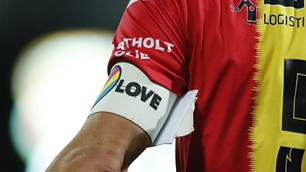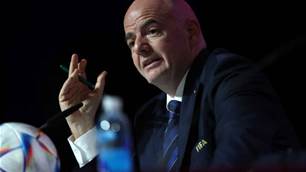FIFA president Sepp Blatter has defended the decision to halt development of goalline technology by claiming the systems are too complicated, too expensive and not foolproof.
Football's rulemakers ended the Premier League's hopes of introducing the technology for the 2009/10 season by freezing any further trials on separate systems being developed by Hawkeye and adidas/Cairos Technologies.
Instead, the International FA Board (IFAB) meeting in Gleneagles decided to push ahead with experiments with two extra assistant referees standing behind each goal-line.
Blatter said: "It is not a change of heart. We have identified very clearly how complicated both systems are and that for the time being they are not accurate.
"After three years of tests, we have had no conclusive results - so we have decided to stop it and put it on ice."
Blatter added that the adidas system, involving a microchip in a ball, had failed in one of seven trial matches during the World Club Championships in Tokyo in December because of interference on the signal being sent to the referee's watch device.
He said the problem of every ball manufacturer needing to insert a chip was also an issue.
The 'Hawkeye' system uses 12 cameras linked to a computer that combines the images, but Blatter said there were problems with that too.
He added: "You cannot ensure it works when there are a bunch of players inside the goalmouth and you cannot see the ball, or when there is poor visibility.
"FIFA are of the opinion that the systems are very costly, would not add anything to the game and would harm the position of the referee."
The Premier League have spent hundreds of thousands of pounds employing 'Hawkeye', while adidas/Cairos' expenditure probably runs into millions.
FA chief executive Brian Barwick said: "I think goalline technology is now dead in the water, and that is a disappointment to the FA - although we absolutely respect the democracy of the International FA Board."
Premier League spokesman Dan Johnson added: "We are very disappointed - especially having worked so hard to deliver the criteria set out by the IFAB a year ago - but we must respect their view."
The IFAB is made up of the four home associations, who each have a vote, and FIFA who have four. FIFA and the Football Association of Wales all voted to freeze goal-line technology in favour of the extra referees plan put forward by UEFA president Michel Platini.
David Collins, general secretary of the FAW, said: "Football is a game played by human beings, and there was a feeling technology can hinder the flow of the game.
"Other sports have embraced technology, but they are far more stop-start."
Barwick also raised potential problems with having two extra match officials.
He said: "Recruiting referees and assistant referees is an issue for us and many other associations. This would mean two more for each game, so we will have to see how the experiments play out."
Paul Hawkins, managing director of 'Hawkeye', said: "I am gobsmacked, and it's completely out of the blue. A year ago they seemed to want it - we have invested an awful lot of money and now we have no return on that. I am livid."
Instead, the International FA Board (IFAB) meeting in Gleneagles decided to push ahead with experiments with two extra assistant referees standing behind each goal-line.
Blatter said: "It is not a change of heart. We have identified very clearly how complicated both systems are and that for the time being they are not accurate.
"After three years of tests, we have had no conclusive results - so we have decided to stop it and put it on ice."
Blatter added that the adidas system, involving a microchip in a ball, had failed in one of seven trial matches during the World Club Championships in Tokyo in December because of interference on the signal being sent to the referee's watch device.
He said the problem of every ball manufacturer needing to insert a chip was also an issue.
The 'Hawkeye' system uses 12 cameras linked to a computer that combines the images, but Blatter said there were problems with that too.
He added: "You cannot ensure it works when there are a bunch of players inside the goalmouth and you cannot see the ball, or when there is poor visibility.
"FIFA are of the opinion that the systems are very costly, would not add anything to the game and would harm the position of the referee."
The Premier League have spent hundreds of thousands of pounds employing 'Hawkeye', while adidas/Cairos' expenditure probably runs into millions.
FA chief executive Brian Barwick said: "I think goalline technology is now dead in the water, and that is a disappointment to the FA - although we absolutely respect the democracy of the International FA Board."
Premier League spokesman Dan Johnson added: "We are very disappointed - especially having worked so hard to deliver the criteria set out by the IFAB a year ago - but we must respect their view."
The IFAB is made up of the four home associations, who each have a vote, and FIFA who have four. FIFA and the Football Association of Wales all voted to freeze goal-line technology in favour of the extra referees plan put forward by UEFA president Michel Platini.
David Collins, general secretary of the FAW, said: "Football is a game played by human beings, and there was a feeling technology can hinder the flow of the game.
"Other sports have embraced technology, but they are far more stop-start."
Barwick also raised potential problems with having two extra match officials.
He said: "Recruiting referees and assistant referees is an issue for us and many other associations. This would mean two more for each game, so we will have to see how the experiments play out."
Paul Hawkins, managing director of 'Hawkeye', said: "I am gobsmacked, and it's completely out of the blue. A year ago they seemed to want it - we have invested an awful lot of money and now we have no return on that. I am livid."
Copyright (c) Press Association
Related Articles

Morocco blazing a trail for Arab women's football participation

FIFA blasted for OneLove armband threat













